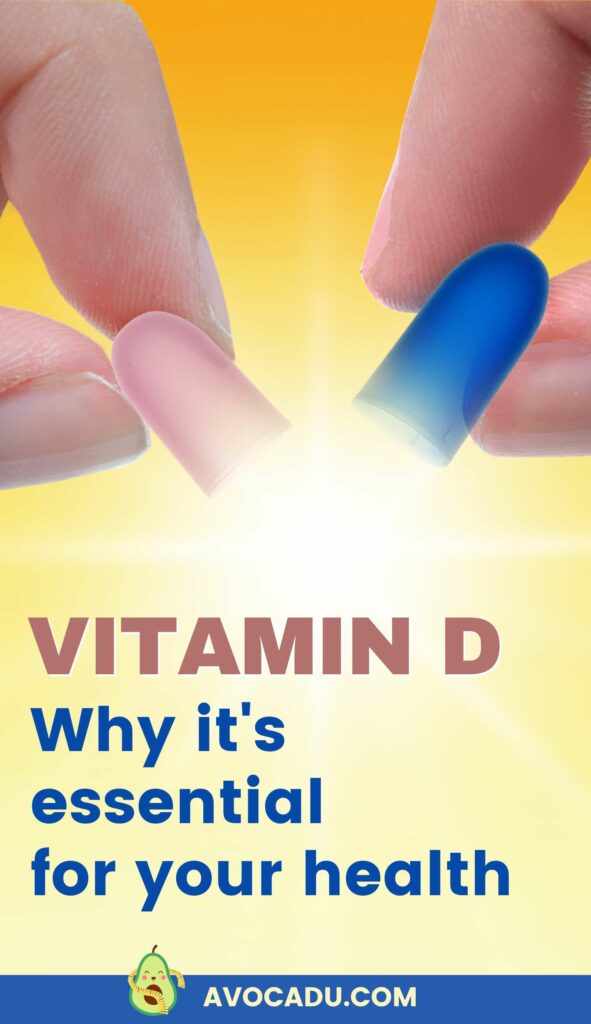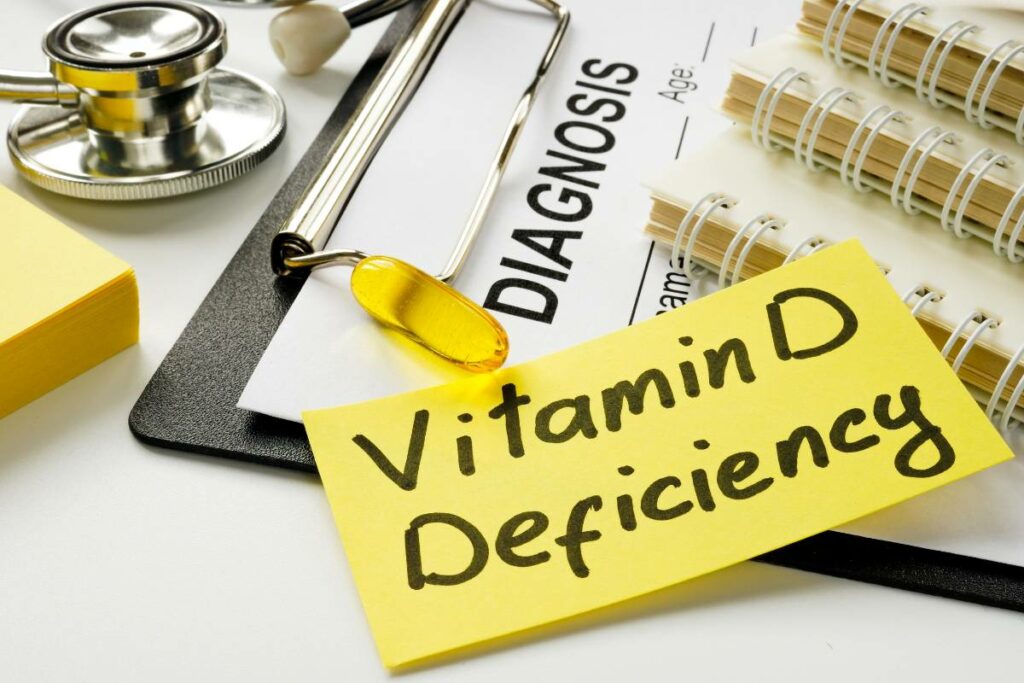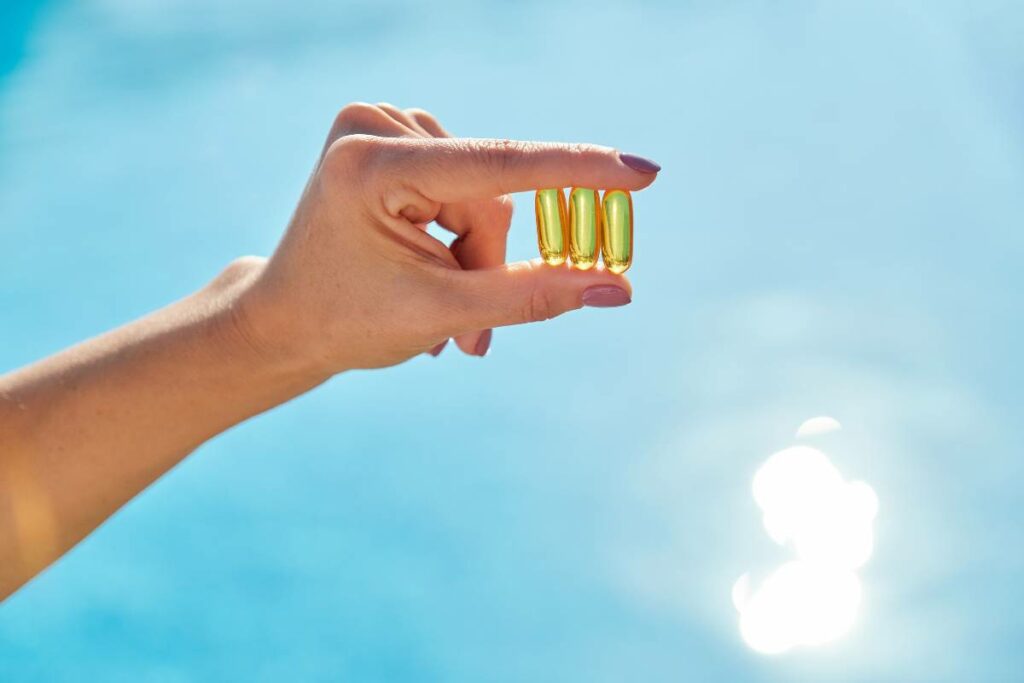The Sunshine Vitamin: Why Vitamin D is Essential for Your Health
Ever wondered why the first rays of the morning sun make you feel warm, fuzzy, and just fantastic?
It’s partly because your body is soaking up its daily dose of the ‘Sunshine Vitamin’ – Vitamin D.
This delightful vitamin has some pretty impressive health benefits that we’re going to dive into right now.

This post may contain affiliate links, which helps keep this content free. Please read our disclosure for more info.
What is Vitamin D?
Vitamin D is not just a regular vitamin. Unlike its other vitamin siblings that we get solely from the food we eat, Vitamin D stands out.
Why, you ask? Because our brilliant bodies can actually whip up their very own batch of Vitamin D! All it needs is a little nudge from the sun’s rays.
Imagine this: you’re out in the sun, your skin is soaking up the warm, golden rays, and BAM! – your body is busy manufacturing Vitamin D. Now, how cool is that?
But it’s not a one-size-fits-all kind of deal. Vitamin D comes in two forms – D2 and D3.
Vitamin D2, also known as ergocalciferol, is the shy member of the family. We typically get it from fortified foods and plant sources, like mushrooms. Yes, you heard that right, those delicious fungi that you toss into your salads and pastas are a source of Vitamin D2!
Now let’s move on to D3, also called cholecalciferol. It’s the life of the party, mostly because it’s the form that our bodies naturally produce when our skin does its thing with the sun.

We can also get D3 from certain foods, especially animal-based ones like fatty fish, cheese, and egg yolks.
Together, both D2 and D3 play a massive part in our health. So whether you’re catching some rays or digging into a bowl of mushroom pasta, remember that you’re doing your body a vitamin-filled favor!
The Importance of Vitamin D in Our Body
Vitamin D is something of a health champion. It plays a key role in making sure our bones are strong by helping with calcium absorption, which is super important for avoiding conditions like osteoporosis.

Vitamin D is also like a support crew for our immune system. It strengthens our defenses, so we’re better at fighting off viruses and bacteria.
When it comes to heart health, Vitamin D is on it. It’s actively involved in keeping our blood pressure levels balanced and contributes to the well-being of our cardiovascular system.
Vitamin D is also mindful of our mental health. It’s involved in brain functions and can be a positive influence on our mood.
And let’s not forget muscles – Vitamin D helps them work properly, supporting both contraction and relaxation, which is crucial for physical activity.
In short, Vitamin D is quite versatile when it comes to supporting our health.
Symptoms and Consequences of Vitamin D Deficiency
When Vitamin D levels in the body are deficient, a variety of uncomfortable symptoms can occur. Fatigue is one of the most common signs that your Vitamin D might be low.

This isn’t just the usual tiredness we all experience from a busy day or a poor night’s sleep – it’s a persistent feeling of exhaustion that isn’t easily resolved by rest.
Pain, specifically in the bones and back, can also be a signal of Vitamin D deficiency. Remember, Vitamin D is vital for calcium absorption, which is needed for bone health. Without enough Vitamin D, bones can weaken, leading to discomfort and pain.
Depression may be another symptom of low Vitamin D. This crucial vitamin is involved in mood regulation and a deficiency might influence mood disorders. This is a complex relationship and is currently a significant focus of research.
Muscle weakness is another sign to look out for. Since Vitamin D plays a role in muscle function, low levels can lead to decreased muscle strength.
Over the long term, persistently low levels of Vitamin D can lead to even more serious health problems. These include cardiovascular diseases like hypertension and heart disease, cognitive impairments such as dementia, and an increased risk of certain types of cancer.
So, ensuring your body has adequate Vitamin D is not just about avoiding immediate symptoms, it’s about long-term health and wellness too.
Side Note: The Sun, Vitamin D, and the Cancer Conundrum

Here’s a fascinating conundrum: sunlight, our primary source of Vitamin D, can both protect against certain types of cancer and potentially cause skin cancer. How can this be? It all comes down to balance and moderation.
On one hand, we know that adequate levels of Vitamin D play a role in cancer prevention. Several studies have suggested that higher levels of this vitamin may protect against certain types of cancer, including colon, prostate, and perhaps breast cancers.
This protection is believed to stem from Vitamin D’s role in regulating cell growth and promoting cellular differentiation.
On the flip side, excessive exposure to sunlight can lead to skin cancer, specifically melanoma. This is due to the harmful ultraviolet (UV) rays from the sun that can damage the DNA in our skin cells, leading to mutations that may result in cancer.
So, what’s the solution? Balance. Moderate sun exposure can help your body produce the Vitamin D it needs for numerous health benefits, including potential cancer prevention.
However, it’s also crucial to protect your skin from excessive sun exposure to reduce the risk of skin cancer.
This balance might include short periods of sun exposure, alongside the use of sunscreen, protective clothing, and possibly Vitamin D supplementation under the advice of a healthcare provider.
Remember, when it comes to the sun, Vitamin D, and cancer, it’s all about finding that “Goldilocks zone” – not too little, not too much, but just right.
Who is at Risk of Vitamin D Deficiency?

Vitamin D deficiency doesn’t discriminate, but certain groups are more at risk than others.
First, let’s talk about age. As we grow older, our skin’s ability to produce Vitamin D from sunlight decreases. This means the elderly, especially those above the age of 65, are more susceptible to Vitamin D deficiency.
Then there’s the issue of skin tone. People with darker skin have more melanin, a pigment that absorbs UV light and reduces the skin’s ability to produce Vitamin D.
This means individuals with darker skin tones may need longer sun exposure compared to those with lighter skin to produce the same amount of Vitamin D.
Lifestyle and geography also play a significant role. If you’re often indoors – perhaps due to work, lifestyle choices, or health conditions – you’re not getting much sunshine, reducing your body’s chance to manufacture Vitamin D.
Similarly, if you live in regions with less sunshine – think of those far from the equator or places with long, gloomy winters – your sun-derived Vitamin D production might be less than optimal.
While sunscreen is critical for protecting our skin from harmful UV rays, it’s a double-edged sword when it comes to Vitamin D production.

Sunscreen blocks the very UVB rays that our skin needs to produce Vitamin D. So, individuals who always use sunscreen might have lower Vitamin D levels.
Understanding these risk factors for Vitamin D deficiency can help you and your healthcare provider come up with an effective strategy for ensuring you get enough of this essential vitamin, be it through diet, supplements, or safe sun exposure.
How to Ensure Adequate Vitamin D Intake
Ensuring an adequate intake of Vitamin D might seem like a challenge, especially for those at risk of deficiency, but don’t worry! There are several ways you can boost your Vitamin D levels.

Sun exposure is a natural and effective way to up your Vitamin D. Aim for safe sun exposure of about 10 to 30 minutes around midday, several times per week.
However, the exact time needed can vary based on factors such as skin type, age, geographical location, and the current UV index.
While sun exposure is beneficial for Vitamin D synthesis, it’s essential to protect your skin from burning to prevent skin damage and potential skin cancer.
Eating Vitamin D-rich foods is another route. If you’re a fan of seafood, fatty fish like salmon, mackerel, and sardines are great sources. Cheese and egg yolks also pack a decent Vitamin D punch.
Don’t forget about fortified foods, like some dairy products, orange juice, and cereals – they can be a valuable source of Vitamin D, too.
However, if you live in areas with less sunshine or prefer a plant-based diet, getting enough Vitamin D from sunlight and food might be a bit challenging.
In this case, Vitamin D supplements can come to your rescue. Available in various forms, from pills to liquids, they can help you meet your Vitamin D needs.

It’s always advisable to consult with a healthcare provider before starting any new supplement regimen, as they can provide guidance on the right dosage for you.
If you’re unsure about your Vitamin D status, a quick and simple blood test can provide the answers. It can measure the level of 25-hydroxy vitamin D in your blood – the best indicator of your Vitamin D status.
With a combination of safe sun exposure, a balanced diet, possibly some supplements, and regular checks, you can ensure your Vitamin D levels stay just right.
The Importance of Balancing Vitamin D Intake
While ensuring an adequate Vitamin D intake is crucial, it’s equally important to avoid going overboard. After all, balance is vital in almost every aspect of health, and Vitamin D intake is no exception.
Vitamin D toxicity, also known as hypervitaminosis D, although rare, can occur if you get too much Vitamin D.
This excess can lead to a condition called hypercalcemia, where there’s too much calcium in your blood. When Vitamin D is too high, it can lead to an over-absorption of calcium, causing this buildup.
The symptoms of hypercalcemia can vary and may initially be subtle. They can include nausea, vomiting, and weakness, which might be easy to shrug off or misattribute to something else.
More persistent or severe symptoms can include frequent urination, thirst, constipation, and even confusion or dizziness.

In extreme cases, if left untreated, high blood calcium can cause kidney stones, bone pain, or more seriously, damage to the heart and kidneys. Therefore, it’s crucial to aim for a healthy balance with Vitamin D, just like with all nutrients.
While sun exposure typically doesn’t lead to Vitamin D toxicity due to the body’s self-regulation, excessive use of supplements might. Hence, it’s crucial to take supplements as recommended by a healthcare provider and not exceed the prescribed dose.
Remember, the goal isn’t to get the maximum amount of Vitamin D possible, but to maintain an optimal level that supports your overall health and well-being.
So, don’t shun the sun completely, but also don’t overdo it. Enjoy Vitamin D-rich foods and use supplements responsibly if needed. As with so much in life, balance is key.
Wrapping Up the Sunshine Story: The Key Takeaways

So, that’s the scoop on Vitamin D, our unsung hero! As we’ve seen, this Sunshine Vitamin works tirelessly behind the scenes, supporting everything from bone health to our mood.
Getting a good dose of sunshine, feasting on Vitamin D-rich foods, and maintaining a balanced approach to intake can ensure this vitamin continues its stellar work in our bodies.
Your body appreciates all you do to keep it healthy, and taking care of your Vitamin D levels is a big part of that.

